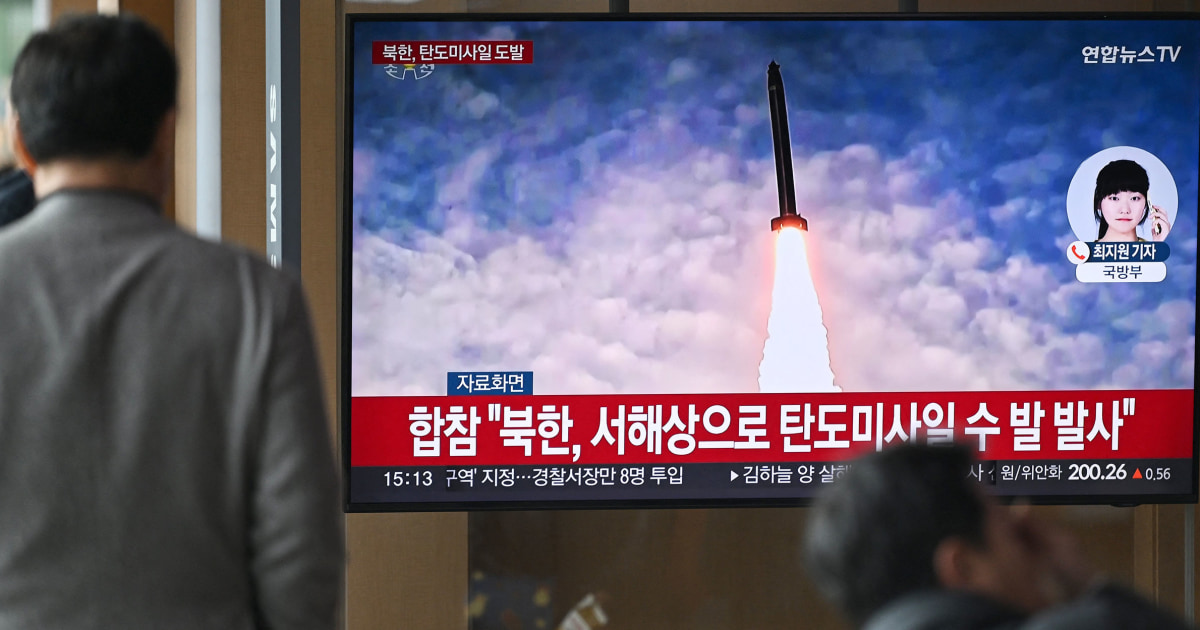Tensions Escalate: North Korea Launches Ballistic Missiles Amid U.S.-South Korea Drills
In a provocative show of military power, North Korea has launched multiple ballistic missiles into the sea, coinciding with the start of joint military exercises between the United States and South Korea. This escalation not only heightens tensions on the Korean Peninsula but also raises serious concerns about regional security and potential retaliatory measures. As the world watches these developments unfold, it’s essential to explore the implications of North Korea’s actions and the international response.
The Context of the Missile Launches
The recent missile tests by North Korea came as the U.S. and South Korea commenced their annual military drills, known as “Freedom Shield.” These exercises, which focus on enhancing the readiness of both armies to counter any potential aggression from the North, have historically been met with fierce opposition from Pyongyang. North Korea perceives these drills as a direct threat to its sovereignty, often responding with military provocations of its own.
According to South Korean military officials, the missiles were fired from the North’s east coast and landed in the Sea of Japan, also known as the East Sea. These launches mark one of the many escalations in North Korea’s missile program, which has been a focal point of concern for neighboring countries and the international community.
The Nature of North Korea’s Missile Program
North Korea has been developing its ballistic missile technology for years, with the aim of achieving a credible deterrent against what it views as external threats. The regime has successfully tested various types of missiles, including intercontinental ballistic missiles (ICBMs) capable of reaching the U.S. mainland. The recent launches are believed to be part of a broader strategy to showcase its military capabilities amid increasing international scrutiny.
- Short-range missiles: These are often used for testing and demonstration purposes, showcasing North Korea’s ability to hit targets in South Korea.
- Medium-range missiles: Capable of reaching Japan and U.S. military bases in the region, these missiles are a significant concern for regional security.
- ICBMs: These long-range missiles have the potential to carry nuclear warheads and can reach the continental United States.
International Reactions to the Missile Launches
The international community has responded with alarm to North Korea’s latest missile tests. The United States condemned the launches, stating they pose a direct threat to regional stability. U.S. Secretary of State Antony Blinken emphasized the need for a united front in addressing North Korea’s provocative behavior.
South Korea’s response was equally firm, with President Yoon Suk-yeol affirming the country’s commitment to its defense alliances. “We will not tolerate any threats to our national security,” he declared, signaling a readiness to respond decisively to any further provocations.
Moreover, Japan has expressed its concerns, with Prime Minister Fumio Kishida calling for enhanced cooperation among allies to counter North Korea’s missile threats. This trilateral approach among the U.S., South Korea, and Japan is crucial for maintaining stability in the region.
Potential Consequences for Regional Security
The ongoing tensions and military activities on the Korean Peninsula could have several significant implications:
- Increased military readiness: Both the U.S. and South Korea may escalate their military preparedness, potentially leading to a more militarized environment on the peninsula.
- Diplomatic isolation for North Korea: Continued missile tests may further isolate North Korea from the international community, prompting stricter sanctions and diplomatic measures.
- Risk of miscalculation: In a tense atmosphere, the possibility of miscommunication or miscalculation could lead to unintended military confrontations.
The Role of Diplomacy
Amid these escalating tensions, the importance of diplomacy cannot be overstated. Past negotiations, including the historic summits between North Korean leader Kim Jong-un and former U.S. President Donald Trump, highlighted the potential for dialogue in reducing tensions. However, the lack of progress in denuclearization talks has left many skeptical about the prospects for future negotiations.
Experts argue that a renewed diplomatic effort is vital. Engaging North Korea in constructive dialogue could help de-escalate military tensions and pave the way for meaningful agreements. This approach would require a commitment from all parties involved, including a willingness to address North Korea’s security concerns and economic incentives for denuclearization.
The Humanitarian Aspect
Beyond the military and political implications, it’s important to consider the humanitarian aspect of the situation. The people of North Korea continue to face severe economic challenges, exacerbated by international sanctions and the regime’s focus on military development. The escalation of tensions often diverts attention from the pressing humanitarian needs within the country.
Human rights organizations have long called for a more balanced approach that considers the welfare of the North Korean populace. Addressing humanitarian issues alongside security concerns could foster goodwill and create an environment more conducive to dialogue.
Looking Forward: A Call for Stability
The recent missile launches by North Korea, occurring amid U.S.-South Korea military drills, serve as a stark reminder of the fragility of peace on the Korean Peninsula. As tensions escalate, the international community must remain vigilant while advocating for diplomatic solutions that prioritize stability and security in the region.
Ultimately, a multifaceted approach that combines military readiness with diplomatic engagement and humanitarian considerations could pave the way for a more peaceful future. The world is watching closely, and the hope is that leaders will choose dialogue over confrontation, fostering understanding and cooperation for lasting peace in Northeast Asia.
See more CNN Headline


